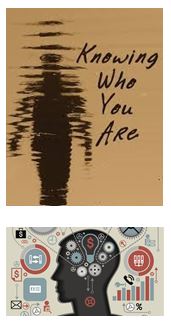Knowing
Thursday 19 Jan 2017
Last year I wrote a piece called “Belief Faith & Knowing”. In it I tried to show that “Belief” is totally conditioned and when we are trapped inside its ideas, we can only ever know a relative kind of truth. I also tried to show that “Faith”, which also relies on conditioning, is still trapped in a belief system but its conditioning can be focussed towards the unconditioned. So it can be a cause to help us let go of beliefs --- to even hold no beliefs as we begin to understand knowing. Then there is the “Knowing” itself, which starts to move beyond conditioning and into the unconditioned, with the knowledge and wisdom that this experience can bring.

Ajahn Amaro talked about a refinement of these Three Characteristics as taught in Buddhism --- “Sunnata Tathata and Atammayata”. These are Pali words meaning “Emptiness”, “Suchness” --- which means there is nothing, yet there is something, and finally “Not made of That”, which can subjectively mean --- non identification and objectively mean nonfashioning or unconcoctability. One can see immediately the limitations in trying to grasp words to describe the experience of this non-dual situation. It goes beyond subject and object. This is where the power of knowing really starts to be understood. It is a quality that can be developed, always to be present. The still consciousness of mind, which is like the boundary between the apparent and the transcendence, points to it all the time. It is a universal experience.
To the extent that this teaching will hit home depends on our ability to hold it and be with it without being distracted back into the world. The Buddhist practice of Meditation and its power to make our minds still holds the key for this understanding. This “no-self” experience and an initial belief in it can be there to develop faith, allowing us to go deeper, beyond any doubts into stillness. This allows us to let go further! Here we can start to experience and know the feedback process that is taking place all at the same time. We see the stillness being fed back into the present moment, beginning and ending, as the Buddha said, trillions of times in the wink of an eye. Contemplation allows us to see how the world is piggy backed onto this still consciousness, using it to move and shape the apparent world only to be transcended in same moment. The stillness penetrating to create and dissolve! We start to see how the still consciousness aggregates with movement to bring perception and feeling with the physical realm forming and ending all in the present moment, using this powerful mental energy of stillness derived from our meditation.
Resting with the still consciousness eventually allows our personal mind stream of consciousness to become one with the world. As it settles further, “Knowing” can see that this still consciousness has the propensity to finish. Knowing knows that it has finished. At this point knowing also knows that there is no karma being made. The apparent world is still in place but it has collapsed and unified into the mind of this individual mind stream. The practitioner will know that when this body dies it will not be reborn.
 Rebirth can only happen when the individual mind stream of consciousness is going out into the world, interacting and creating. Ignorance of the bigger picture has it believing in the conditions. It is writing itself into the future ready for a rebirth to take it to new life. The past energy of this same individual mind stream is already written into the universal “conscious field” providing the scaffolding to shape the creation. The Buddha called this “Mundane Life”, and one can see that this conditioned life is lived in ignorance. This is not to say that the Universe and the life being lived, is not, at its root --- perfect. It is perfect in every way! Absolute truth abounds in the same way it does in an enlightened world, except that there is ignorance of the Greed Hatred and Aversion that blinds us from seeing how the world begins and ends in the present moment. Time is created and because the universe needs to be balanced, space is brought into existence to provide the relativity needed to keep the perfection. Duality is the price of ignorance. The rub for us is that our ignorance means that we have to live with Dukka (The unsatisfactory nature of the World) and uncertainty. We remain unaware of the still consciousness that moves to create it all.
Rebirth can only happen when the individual mind stream of consciousness is going out into the world, interacting and creating. Ignorance of the bigger picture has it believing in the conditions. It is writing itself into the future ready for a rebirth to take it to new life. The past energy of this same individual mind stream is already written into the universal “conscious field” providing the scaffolding to shape the creation. The Buddha called this “Mundane Life”, and one can see that this conditioned life is lived in ignorance. This is not to say that the Universe and the life being lived, is not, at its root --- perfect. It is perfect in every way! Absolute truth abounds in the same way it does in an enlightened world, except that there is ignorance of the Greed Hatred and Aversion that blinds us from seeing how the world begins and ends in the present moment. Time is created and because the universe needs to be balanced, space is brought into existence to provide the relativity needed to keep the perfection. Duality is the price of ignorance. The rub for us is that our ignorance means that we have to live with Dukka (The unsatisfactory nature of the World) and uncertainty. We remain unaware of the still consciousness that moves to create it all.
When the mind stream of the practitioner has collapsed and unified, and he/she knows that the world is no longer external, their work is all but done. The Buddha called a mind stream like this “Supra Mundane”, meaning the practitioner is not living in ignorance and has an overview of world and how it works. If this practitioner dies “Knowing” this state, they will know that there will be no more rebirths. There knowing will collapse into Nibbana. There work finished. If they have known this state but happen to die at a time when they were not mindful, the Buddha said that the rebirth and if there are subsequent rebirths will bring lives that incline their mind stream towards enlightenment very soon. He encouraged us to practice and he actually said, “The house of self is on fire; get out as quickly as you can!”
It is important to emphasise that this is not a nihilistic experience. I am not talking about Atheism. Nor am I talking about a God or a Deity. It is a balanced pathway between extremes, --- “The Middle Way!” It is a pathway to freedom! Ajahn Amoro’s input above is very relevant when he looks at “Sunnata Tathata and Atammayata”. Only the experience of “Knowing” can really understand. Words, no matter how good will always let us down. When the Buddha was asked to explain Nibbana, he is said to have --- “Maintained a Noble Silence”……….






